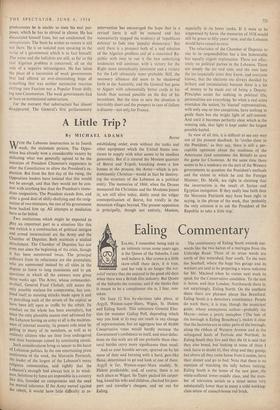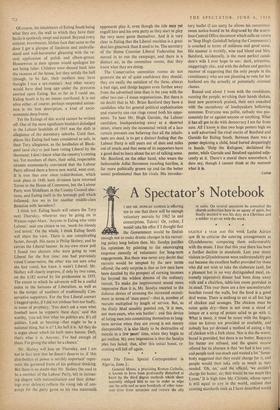Ealing Commentary
On June 12 five by-elections take place, at Argyll, Weston-super-Mare, Wigan, St. Helens and Ealing South. This miniature General Elec- tion (or monster Gallup Poll, depending which way you look at it) may not result in any change of representation, but an aggregate loss of 40,000 Conservative votes would hardly increase the Government's confidence in itself, and since defec- tions on this scale are all too probable these elec- toral battles carry more significance than usual.
And so your humble servant, spurred on by his sense of duty and burning with a hard, gem-like flame, determined to go and look at one of them. Argyll is far, Weston-super-Mare muddy, St. Helens predictable; and, of course, there is no such place as Wigan. So Taper packed his carpet- bag, kissed his wife and children, checked his pass- port and traveller's cheques, and set out for Ealing. The constituency of Ealing South extends out- wards like the two halves of a meringue from the Uxbridge Road. Three of its seven wards are north of this watershed, four south. To the west lies Southall, where the huge bus garage and its workers are said to be preparing a warm welcome for Mr. Macleod when he comes next week to speak for the Conservative candidate. To the east is Acton, and then London. Northwards there is, not surprisingly, Ealing North. On the southern shore there are pleasant places like Brentford. Ealing South is a dormitory constituency. People do work there, it is true, though the municipal guide, whose anonymous author—probably the Mayor—mixes a pretty metaphor (`The hub of the borough is Ealing Broadway'), makes it clear that the factories are in other parts of the borough, along the ribbon of Western Avenue and in the subjugated lands of Perivale and Northolt. In Ealing South they live and they die (it is said that they also breed, but looking at some of them I took leave to doubt it), they shop and they gossip, but above all they come home from London, have their dinner and go to bed. Note that there is no mention of watching the telly before retiring; Ealing South is the home of the new poor, the white-collared lower-middle class, and the num- ber of television aerials to a street seems very substantially lower than in many a solid working- class estate of council-house red brick. Of course, the inhabitants of Ealing South being what they are, the wall to which they have their backs is spotlessly swept and dusted. Beyond every reticent, browbeaten, lifeless face that came to the door I got a glimpse of linoleum and umbrella- stand and wall-barometer gleaming with the re- cent application of polish and elbow-grease. Housewives in their aprons would apologise for not being tidier. Children were shooed back into the recesses of the house, lest they untidy the hall (though, to be fair, their mothers may have thought 1 was a sex-maniac). Any other society would have died long ago under the pressures exerted upon Ealing. But as far as I could see, Ealing South is by no means moribund. It is not alive either, of course; perhaps suspended anima- tion is the best description, a kind of socio- economic deep freeze.
Yet the Ealings of this world cannot be written off. One of the most significant boulders dislodged in the Labour landslide of 1945 was the shift in allegiance of the dormitory suburbs. Until then, places like Ealing had been considered as safe, in their Tory allegiance, as the landladies of Black- pool (and they've just been voting Liberal by the thousand; I don't know what the country's coming to). Yet numbers of them, their solid, respectable citizens momentarily convinced that the Labour Party offered them a brave new world, went over. It is true that ever since redistribution, which took place in 1948, both divisions have returned Tories to the House of Commons, but the Labour Party won Middlesex in the County Council elec- tions, and Ealing itself in the borough poll which followed. Are we in for another middle-class flirtation with Socialism?
1 think not. Ealing South will return the Tory next Thursday, whatever may be going on in Weston-super-Mare. 'Anyone in Ealing who votes Labour,' said one citizen to me, 'needs his bloody 'ead tested.' On the whole, I think Ealing South will share his view. There is one complicating factor, though. His name is Philip Skelsey, and he carries the Liberal banner. In my own straw poll I found two electors who were going to vote Liberal for the first time; one had previously voted Conservative, the other was not sure what she had voted, but knew it wasn't Liberal. Mr. Skelsey will clearly improve, if only by two votes, on the 4,182 scored by his predecessor in 1955. The extent to which he advances will be a useful index to the fortunes of Liberalism, as well as to the temper of numbers of traditionally Con- servative supporters. For the first Liberal convert I bagged spoke, if I did not mishear him too badly, in tones of prophecy. 'You don't ask a man what football team he supports these days,' said this worthy, 'you ask him what his politics are. It's all politics. Look at housing—that ought to be a national thing, but is it? Like hell it is. All they do is argue about which lot built more houses. Daft, that's what it is. Anyway, I've had enough of them. I'm giving the other lot a chance.'
Mr. Skelsey will lose on Thursday, and I am not in fact sure that he doesn't deserve to, if 'this distribution of power is terribly important' repre- sents the garnered fruits of his political thinking. But there is no doubt that Mr. Skelsey (he used to be a member of the Labour Party, left in increas- ing disgust with nationalisation and their dither- ings over defence) reflects the rising tide of con- tempt for the party game as his two mammoth opponents play it, even though the tide may yet engulf him and his own party as they start to play the very same game themselves. And it is very clear in Ealing that the Liberal machine is a great deal less gimcrack than it used to be. The secretary of the Home Counties Liberal Federation has moved in to run the campaign, and there is a distinct air, in the committee rooms, that they know what they are doing.
The Conservative committee rooms do not generate the air of quiet confidence they should; they are easily the untidiest of the three, always a bad sign, and thitigs happen even further away from the advertised time than is the case with the other two mo—I mean organisations. But there is no doubt that in Mr. Brian Batsford they have a candidate who for general political sophistication and maturity can run rings round both his oppo- nents. To hear Mr. Hugh Garside, the Labour candidate, loudspeakering away at a deserted street, where only the occasional twitch of a lace curtain prevents one believing that all the inhabi- tants are dead, is to get a distinct feeling that the Labour Party is still years out of date and miles out of touch, and that some of its supporters have a good deal to learn about the art of talking sense. Mr. Batsford, on the other hand, who wears the fashionable Adlai Stevenson receding hairline, is far more politically grown up and (in the better sense) professional than his rivals. His introduc- tory leaflet (I am sorry he allows his committee- room notice-board to be disgraced by the scurri- lous Central Office document which calls on voters to 'Stop Hugh Gaitskell helping the Communists') is couched in terms of mildness and good sense. His manner is worldly, wise and bland and Mrs. Batsford, incidentally, is the most perfect candi- date's wife I ever hope to see : dark, attractive, staggeringly chic, and with the deftest and gentlest manner of suggesting that the only people in the constituency who are not planning to vote for her husband are the actually or potentially criminal classes.
Round and about 1 went with the candidates, meeting the people, w2tching their hands shaken, their new paintwork praised, their ears assaulted with the cacophony of loudspeakers bellowing nonsense. Everyone was polite, nobody was pas- sionately for or against anyone or anything. What it has all got to do with democracy I am far from sure. All I know is that two huge posters high on a wall advertised the rival merits of Batsford and Garside for Ealing South. Between them was a poster depicting a child, head buried despairingly in hands. 'Help the Refugees,' declaimed the poster, while Garside and Batsford squinted adja- cently at it. There's a moral there somewhere, I dare say, though I cannot think at the moment what it is.
TAPER











































 Previous page
Previous page